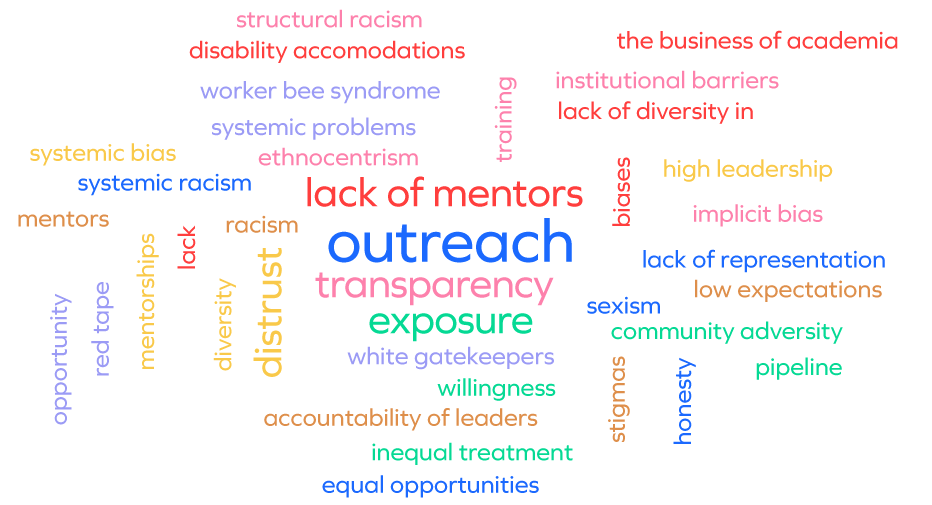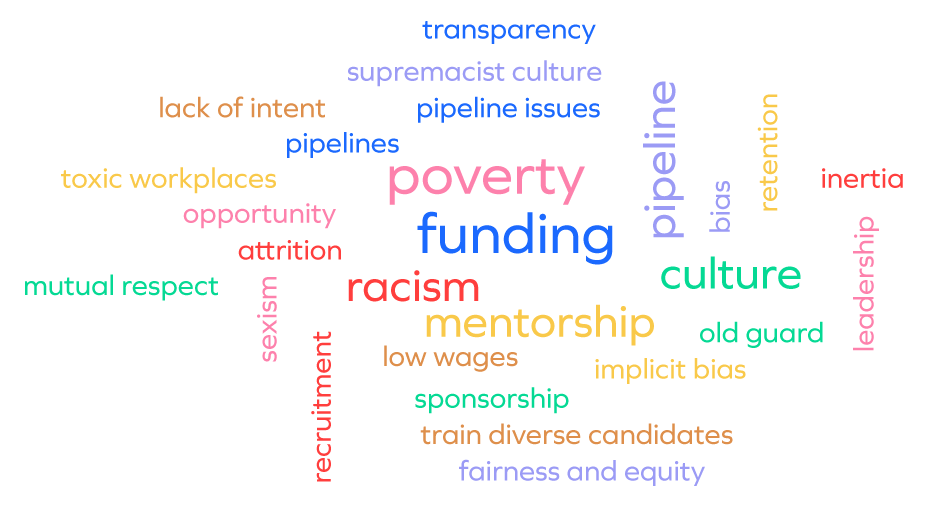The Scientific Workforce Diversity (SWD) Committee, a part of the STRIVE initiative, recently held listening sessions to better understand what steps can be taken to promote diversity among the NICHD-supported workforce. Researchers from within NICHD and the broader scientific community attended. The listening sessions included open-ended questions that sparked conversation about what best contributes to diversity in research for early-career (listening session one) through senior level (listening session two) scientists.
Participants in both sessions discussed many barriers, as well as supports, that greatly impact one’s ability to succeed in the scientific workforce. This article will summarize the broader themes that were echoed across these sessions, specifically focusing on solutions proposed by attendees to combat these challenges and promote diversity. The SWD committee will use the input from these sessions to inform NICHD’s strategic plan implementation, as well as an upcoming workshop titled, “A Pathway to Enhance Workforce Diversity.”
In one or two words, what do you see as the biggest barriers to enhancing diversity in the scientific workforce? Transcripts below.The Importance of Mentoring
Sincere, supportive mentorship was repeatedly mentioned throughout the sessions as one of the most important predictors of success in research. Attendees pointed to mentorship as being particularly vital during early-career development but also noted that opportunities for mentorship should be available at all stages in scientific careers. Many attendees cited a mentor’s cultural insensitivity and poor teaching skills as common characteristics that create significant challenges for trainees. Individuals from underrepresented groups tend to be particularly vulnerable to these traits.
Across all sessions, participants repeatedly voiced that institutional support of mentorship training could help to address these concerns. Training could specifically help mentors develop cultural sensitivity and teaching skills. Finally, any efforts that could lead to the establishment of more mentor-mentee relationships, both within and across institutions, would be particularly beneficial for underrepresented groups in science.
Accommodating for Different Needs
One participant put it quite eloquently when they said that scientific institutions need “diverse policies to support diverse people.” This participant, along with many others, highlighted the importance of accommodating diverse needs among researchers and cited policies that restrict the accessibility of a career in science for many groups. Examples of such policies included restrictions upon additional work outside of research, the inability of undocumented immigrants to apply for certain positions, and inflexible work schedules. Greater accommodations and flexible policies to address these barriers would be beneficial for parents and caretakers, undocumented immigrants, and individuals who need a second income, for example.
Lack of support for mental health was also noted as a common barrier that should be addressed across institutions. Some participants said that a greater consideration for work-life balance could increase the desirability of a career in science and make such occupations more accessible to diverse groups.
Purposeful and Continual Outreach
Attendees emphasized that access to and visibility of scientific careers needs to be bolstered to successfully recruit diverse populations. This exposure to programs in science needs to happen early in education and continuously during training. One commenter even noted that there can never be too many “invitations” sent out to communities and that there is no such thing as too much outreach in trying to promote diversity early in the science pipeline. Additionally, it was noted that administrations can do more to ensure the visibility of opportunities for researchers to develop their careers.
Participants emphasized that researchers and organizers should “meet communities where they are” and utilize local leaders to vouch for the needs of the communities they aim to serve. Such outreach could allow for greater understanding of the needs of diverse communities that are being supported through research, as well as the diverse communities that participate in research.
Addressing Discrimination and Biases in the Workforce
Many participants cited discrimination, biases, and cultural insensitivity/ignorance as major barriers that still plague the scientific community. This was openly discussed as being true at both the individual and institutional levels.
Suggestions to address these ongoing concerns included greater education on diversity, inclusion, and equity across institutions, as well as direct training in allyship and biases for investigators. Some participants noted the importance of considering how discrimination and inequity can create unique challenges for investigators from different groups. For example, a “minority tax” was mentioned as a common challenge faced by individuals from underrepresented groups, in which uncompensated demands and roles are placed upon these individuals to address diversity.
Finally, many attendees noted that NICHD has a responsibility to use its institutional platform to further promote education in topics of discrimination and biases, as well as to practice the use of inclusive policies and language when communicating with the public.
Funding and Financial Support
Participants across sessions discussed financial burdens that create obstacles for researchers who are trying to establish themselves as investigators. These obstacles include hidden costs of traveling to conferences, the additional cost to hire a team for one’s lab, as well as high costs of living in some regions of the country. Participants pointed to financial support for such expenses as a direct solution to many of these barriers. Additionally, many attendees expressed a desire to receive more direct institutional support in the grant writing process.
Using financial incentives to encourage specific practices and policies across institutions is one route NICHD can use to combat many obstacles for diverse groups. Financial programs and grants that directly benefit underrepresented groups can greatly promote diversity. One participant described a previous program that specifically provided funding to African American researchers as being a successful example of this type of support.
Conclusion
Participants provided a hefty amount of honest and constructive feedback during these listening sessions. Receiving feedback from the scientific community on the barriers they face can inform NICHD in future steps to provide support for the workforce. Additionally, this information will help the institute understand how underrepresented groups are uniquely impacted by such barriers and what steps would be most fruitful for promoting diversity.
Wordcloud Transcript
For trainees and early-career scientists (in descending order of frequency):
- Outreach
- Lack of mentors
- Transparency
- Exposure
- Distrust
- Structural racism
- Disability accomodations
- Worker bee syndrome
- Systemic problems
- Ethnocentrism
- Systemic bias
- Systemic racism
- Mentors
- Opportunity
- Red tape
- Mentorships
- Lack
- Diversity
- Racism
- Training
- The business of academia
- Institutional barriers
- Lack of diversity in [sic]
- Biases
- High leadership
- Implicit bias
- Lack of representation
- Low expectations
- Sexism
- Community adversity
- Pipeline
- Stigmas
- Honesty
- White gatekeepers
- Willingness
- Accountability of leaders
- Inequal [sic] treatment
For established scientists and organizations (in descending order of frequency) :
- Poverty
- Funding
- Racism
- Mentorship
- Culture
- Pipeline
- Transparency
- Supremacist culture
- Pipeline issues
- Lack of intent
- Pipelines
- Toxic workplaces
- Opportunity
- Attrition
- Mutual respect
- Sexism
- Recruitment
- Low wages
- Implicit bias
- Sponsorship
- Train diverse candidates
- Fairness and equity
- Bias
- Retention
- Inertia
- Old guard
- Leadership


